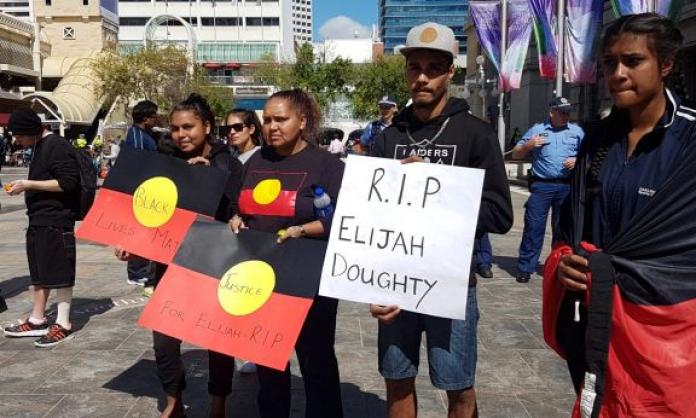Justice has once again been denied to the Indigenous community. In August 2016, Elijah Doughty, an Indigenous teenager from Kalgoorlie, WA, was chased from the road while riding a motorbike and struck down by an unnamed pursuer in a two tonne ute. He was killed instantly. On 21 July, his killer was found not guilty of manslaughter by a Perth jury.
He was instead found guilty of the lesser charge of dangerous driving occasioning death, and as a result could be out of prison as early as February 2018.
In a stunning display of the double standard in the criminal justice system, Elijah’s killer could be out of prison before a man charged over his involvement in the “Kalgoorlie riots” that erupted in the wake of the killing. That protesting the death of a Black teenager at the hands of a white man warrants almost as much time in jail as the killing itself exposes the systematic prejudice of the criminal justice system.
It’s no wonder that Indigenous people in Western Australia are 20 times more likely to be imprisoned than non-Indigenous people. In a recent address to the Criminal Lawyers’ Association of the Northern Territory, the chief justice of Western Australia admitted, “[A]t every single step in the criminal justice process, Aboriginal people fare worse than non-Aboriginal people”.
The police play an important role in entrenching this racism, this case being no exception. In the lead-up to Elijah’s murder, WA police were aware of a number of Facebook vigilante groups as well as vigilante actions carried out against Aboriginal children. Elijah’s grandfather, Albert Doughty, told the media following his grandson’s death, “Kids have been chased in cars for too long, and reported, [but] nothing done about it”. Knowing this, the police directed Elijah’s killer to Gibble Creek, the site of his death. Elijah’s killer made a point of this in his interview when he snapped at detectives and told them, “Tell him [the officer he spoke to]: what was your intention in telling me to go down there and look for it?” After the crime, the police ignored usual crime-scene processes, failing to preserve or examine physical evidence in a way that would be inconceivable had a white person died as Elijah did.
During the trial, police maintained an overbearing presence in both Kalgoorlie and Perth. In spite of the fact that the trial was taking place in Perth, some 600km away, police formed a protective ring around the Kalgoorlie courthouse when the verdict was announced. In Perth, police horses and bikes outnumbered those who had gathered in solidarity outside the court on the morning of the verdict. And glass barriers were erected inside the court in anticipation of violence from the Aboriginal community members present. For the racist police, the grieving Aboriginal community must be treated as the principal threat.
It would be remiss not to mention the media coverage of this case. Initially there was no interest in the death of Elijah; he was just another dead Aboriginal kid in a country town. What drew their attention was the protest that erupted in the wake of his death. A “violent mob”, as many news outlets described it, and a couple of broken windows were a more familiar narrative.
There were no stories about the promising young football star from Kalgoorlie whose life had been cut short. Instead, from that point on, the only story about Elijah that was run relied heavily upon the defence’s version of events. From this, we are told that Elijah was riding a motorbike that had been stolen from the assailant. The implication is that Elijah had stolen it, but this has never been proven. Not one outlet questioned the defence’s assertion that Elijah had swerved in front of the car before he was struck, despite the fact that no one could verify this claim, and police had allowed any evidence that might have contradicted it to be destroyed.
One could only imagine what the response would have been if Elijah and his killer swapped skin colours: he probably would have gone away for murder, not dangerous driving. Instead another Indigenous person has had their life cut short and their name dragged through the mud, and the Indigenous community has been vilified and imprisoned for responding with legitimate anger.








